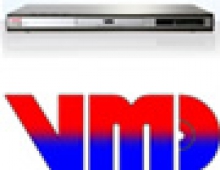
China unveils its own video format
In a move calculated to separate itself from new consumer
electronics standards emerging elsewhere, China announced a new
digital video format called Enhanced Versatile Disc (EVD), a
high-definition consumer optical disk system targeted for use in
much of Asia.
The EVD system, designed to record and playback digital video,
audio and data, will use proprietary video codecs called VP5 and
VP6 developed by On2 Technologies (New York). As part of the EVD
announcement, LSI Logic also claimed to be the first
semiconductor supplier to deliver high-definition EVD technology.
LSI Logic said it would provide encoding and decoding
technologies based on its media processor architecture called
DoMiNo.
China's EVD system can store a two-hour movie in high definition resolution on a single disk without using a blue laser pick up.
The Chinese initiative flies in the face of industry forums, such as the DVD Forum and Blu-ray group, who are competing to define next-generation high-definition optical disk specifications that effectively cover the rest of the world.
Seeking to control its own destiny, China developed its first optical-based format to support high-definition playback for video disk players, home terminals and HDTV devices — tossing a wild card into the worldwide standards debate.
Among the uncertainties posed by the EVD spec is the payment of royalties. When EVD players become capable of playing current generation DVD disks, the EVD system does not necessarily abrogate any Chinese companies' obligation to pay the royalties prescribed in the DVD standard.
However, in moving on to the new high-definition system, it would be more advantageous for China to adopt On2's VP5 and VP6 rather than using MPEG-2 or emerging H.264 standards-based video codecs, said Douglas A. McIntyre, chairman, On2's president and chief executive. “It's a matter of cost and higher compression,” he said.
According to McIntyre, On2 has agreed with Chinese officials to provide its proprietary codecs at $2 per player. The company will charge no fees for disks that use On2's codecs for compression. “When you consider hundreds and thousands of disks to be sold, our scheme for no royalty fee per disk is a big advantage,” he added.
It remains unclear whether China's EVD spec will get any support from Hollywood studios. Michelle Abraham, senior analyst at In-Stat, said, “Studios are sitting on the fence about releasing any high-resolution DVD content. No one seems inclined to move.”
Chinese consumer electronics manufacturers unveiled the first EVD content and EVD optical disk players in an event held at the Great Hall of the People in Beijing on Tuesday. The event was cohosted by several government ministries.
China's EVD system can store a two-hour movie in high definition resolution on a single disk without using a blue laser pick up.
The Chinese initiative flies in the face of industry forums, such as the DVD Forum and Blu-ray group, who are competing to define next-generation high-definition optical disk specifications that effectively cover the rest of the world.
Seeking to control its own destiny, China developed its first optical-based format to support high-definition playback for video disk players, home terminals and HDTV devices — tossing a wild card into the worldwide standards debate.
Among the uncertainties posed by the EVD spec is the payment of royalties. When EVD players become capable of playing current generation DVD disks, the EVD system does not necessarily abrogate any Chinese companies' obligation to pay the royalties prescribed in the DVD standard.
However, in moving on to the new high-definition system, it would be more advantageous for China to adopt On2's VP5 and VP6 rather than using MPEG-2 or emerging H.264 standards-based video codecs, said Douglas A. McIntyre, chairman, On2's president and chief executive. “It's a matter of cost and higher compression,” he said.
According to McIntyre, On2 has agreed with Chinese officials to provide its proprietary codecs at $2 per player. The company will charge no fees for disks that use On2's codecs for compression. “When you consider hundreds and thousands of disks to be sold, our scheme for no royalty fee per disk is a big advantage,” he added.
It remains unclear whether China's EVD spec will get any support from Hollywood studios. Michelle Abraham, senior analyst at In-Stat, said, “Studios are sitting on the fence about releasing any high-resolution DVD content. No one seems inclined to move.”
Chinese consumer electronics manufacturers unveiled the first EVD content and EVD optical disk players in an event held at the Great Hall of the People in Beijing on Tuesday. The event was cohosted by several government ministries.




















